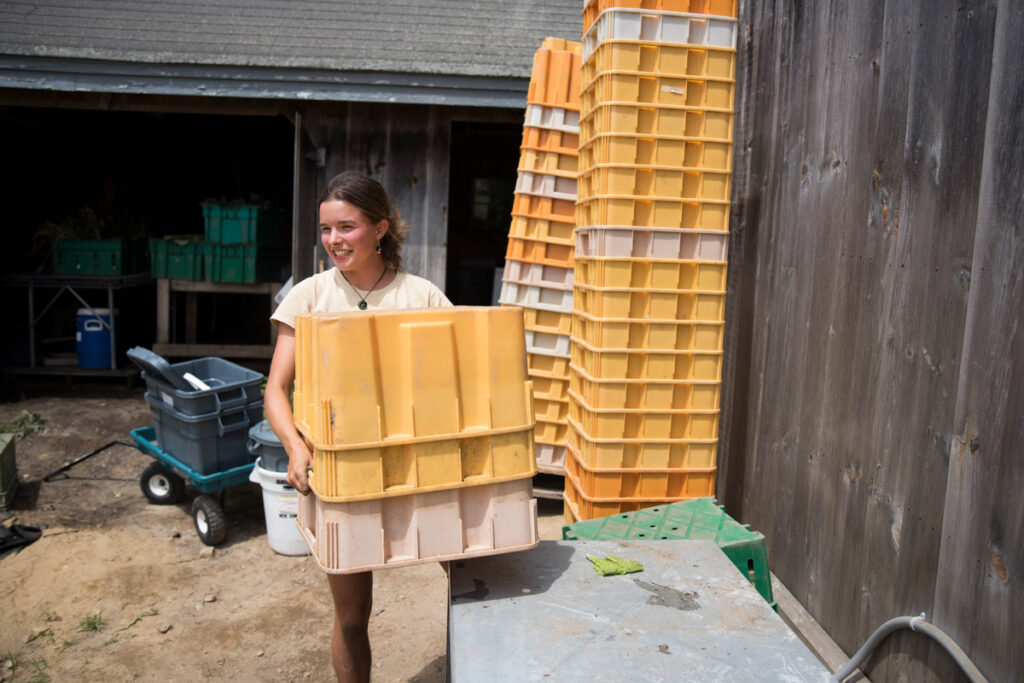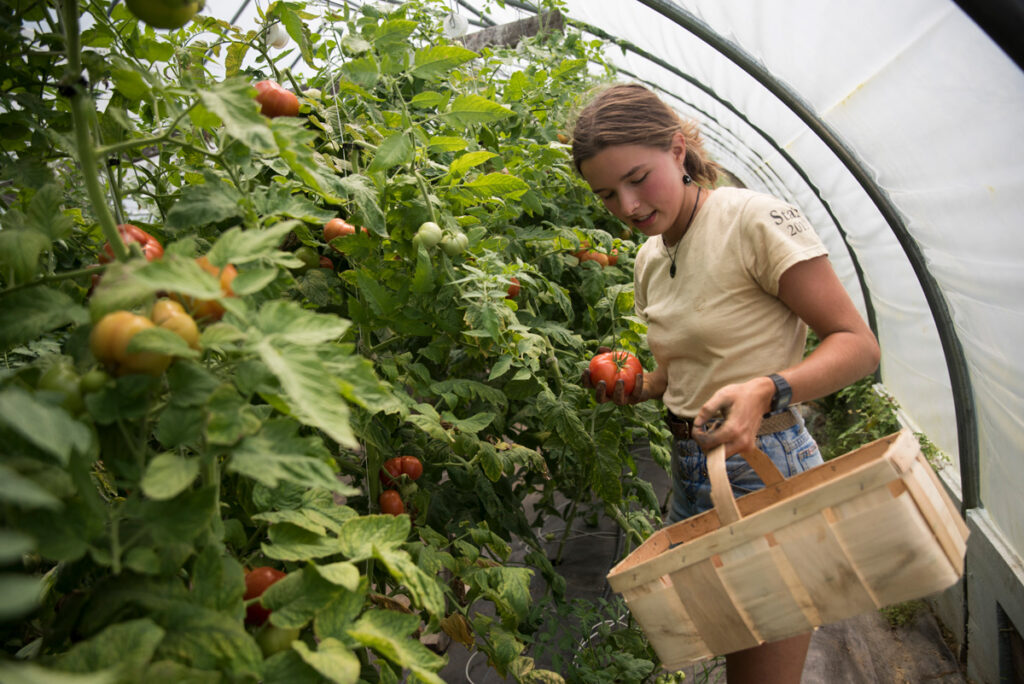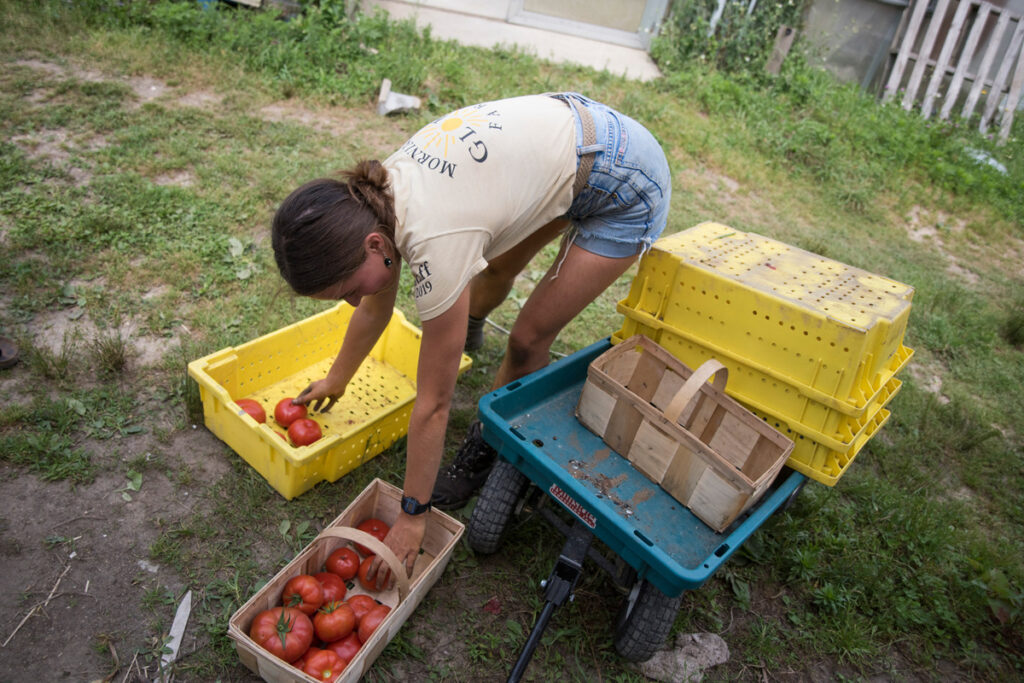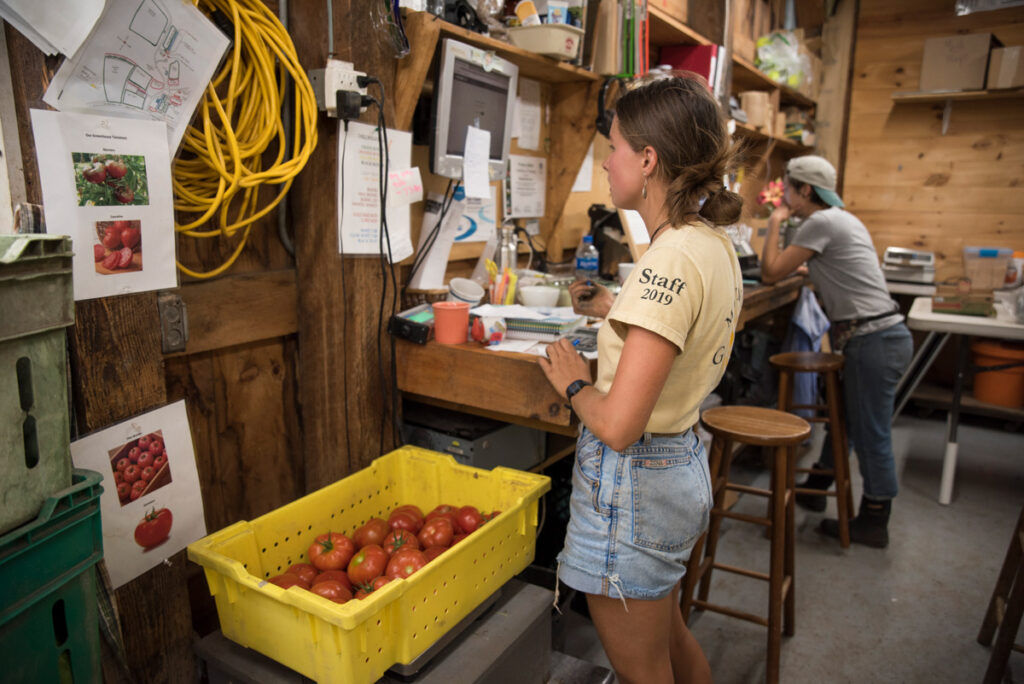Sophie Perry, 20, is living on Martha’s Vineyard for the summer. She swims in the ocean at South Beach every day, wears big funky earrings, and has a deep suntan. Sophie is also covered in dirt by the end of every workday, and said that one of the highlights of her summer was “haying” a farm field. From the outside, she seems like an ordinary college student on summer vacation, but Sophie — a Scripps College environmental science major — is not ordinary, and she’s not on vacation.
Along with almost 70 other young people who flock the farm’s idyllic Edgartown location every year, Sophie is part of the Morning Glory Farm summer work team. As a member of the farm crew, she weeds, makes hay bales, prunes vegetables, and harvests fruit — basically anything that needs to get done, depending on the day.
Morning Glory grows about 250 varieties of 45 crops — for example, they grow seven types of eggplant — in addition to herbs, fruit trees, hay, and about 80 kinds of cut flowers; they keep livestock as well. According to her boss, CEO of Morning Glory Farm Simon Athearn, most young workers find out about working for “MoGlo” through their friends.
“We go on runs of students from single colleges as friends tell friends; we will have a Vassar group for a few years, a Bates group; a large group this year came from Sterling College, and so on,” Athearn said.
The Times shadowed Sophie to experience a typical day in the life of a young worker on Morning Glory Farm.

6:40 AM The sun rises, and so do the farm crew workers
Sophie’s alarm rings at 6:40. Her alarm is actually the last in her room: One roommate also works in the field, and the other wakes at 4:30 to bake MoGlo’s famous zucchini bread. “It’s kind of nice that schedules are staggered so the bathrooms aren’t packed,” she says to me.
She lives right above the farm stand in the Barnhouse. “My commute is pretty easy,” she laughs.
She typically eats Mermaid Farm yogurt topped with granola and honey for breakfast. Included in the employee discount is a daily free cup of iced coffee, of which Sophie regularly partakes.
Even though she’s on her hands and knees in the fields most days, she said her work uniform doesn’t look much different from what she would wear on a daily basis anywhere else: a T shirt, shorts, hair pulled back in a bun, dangling earrings, a hat, long socks, and work boots. If it’s chilly, or she has to handle hay, she changes into jeans. To finish: an essential layer of bug spray and tick spray.
7:30 am: Good morning, Morning Glory!
The farm crew meets up at 7:30 every morning to get their assignments. Typically, morning work means harvesting. Onions, garlic, and root vegetables are her favorite plants to yank out of the earth. “They’re so satisfying!” she sighs.
This particular July day, the snap peas were plump for the picking, so Sophie spent much of the morning taking them off the vine. Once she picks all the ripe vegetables, she carries the full box, or hauls it in a wagon, to the back of the farm stand to be weighed, entered into their online catalog, and stored in a place from which boxes in the farm stand can be replenished. Sophie says that on her first day, she didn’t know how to do any of those things.
“At the beginning I was like, ‘I don’t know anything!’ and I would just ask for help,” she says. “Everyone is knowledgeable and helpful, so it’s not a stressful environment to learn new things.”
She’s also learned how to stack tomatoes in boxes after they’re plucked from the vine: “The ‘shoulders’ [top edge] of the tomato are stronger, so if you place them face-down in the pallet, they can hold the weight of another layer of tomatoes on top of them.”
Some tasks take all morning, and some take only an hour, then they move on to whatever else needs to get done.


12 pm: Lunchtime for the farm crew
Part of the employee agreement is a $1-per-day lunch at the farm stand. Sophie usually eats whatever vegetarian dish the kitchen has cooked up for the day.
“It’s cool to hear from the cooks how they transform the harvest and see the bigger picture,” Sophie says. “They’ll sometimes tell me, ‘Oh yeah, that broccoli you’re eating? You picked that this morning!’ I think we’re all impressed by each other.”
Her favorite Morning Glory foods to eat? “There’s nothing like fresh strawberries, especially if they’ve been left out in the sun and are warm when you bite them,” she says. The heirloom tomatoes were her winner for favorite vegetable.
Sophie says that she was surprised by how large the network of young farmers is on the Island. “I’ve made a lot of good friends,” she says.
As a student studying environmental science, she appreciates that Morning Glory applies as many sustainable practices as possible, and “minimizes waste through production.”
Outside the classroom, she said that it is eye-opening to see how sustainability is practiced on a real farm, and how sometimes economic sacrifices have to be made in order to maintain eco-friendliness.
“Tomatoes that fall on the ground are used by the kitchen in gazpacho,” she says.
After this reporter accidentally stepped on a fallen fruit, I gasped and profusely apologized, but she shrugged her shoulders, “It’s OK! It will just go to the compost. We use everything here.”


1 pm: Afternoon assignments, and back to work
The afternoon is usually field maintenance and more harvesting. Today Sophie drives out to Norton Field (a five-minute walk from the farm stand) to tend to the tomato plants.
It’s all about learning while working. When we met up with her, she had just been taught how to prune the “sucker” stalks off growing tomato plants, so the plant diverts energy to growing tomatoes, not the rest of the plant.
Sophie hops down several rows of tomato plants, then her manager tells her to check on the ‘Geronimo’ tomatoes growing in one of the greenhouses; we follow her as she walks down each row and pick only the fruits that are bright-red “textbook tomatoes.”
We ask if she ever gets bored with so many tedious tasks. She shakes her head. “[The tasks] are super-satisfying and meditative.” She says that she loves to have time to think.
Although the repetitive nature of the work can become mundane, wearing headphones is prohibited to encourage conversation and focus. However, Sophie tells me, occasionally someone will bring their speakers to blast tunes for everyone to hear.
Some of her friends, she says, thought that she was a little crazy to work on a farm over the summer when she could be working in an office job or an internship elsewhere.
“People who don’t really know me well, when they asked me what I’m doing for the summer, and I tell them I’m working on a farm, they say, ‘Wow, do you really want to be dirty all the time and work in the rain?’ and I’m like ‘Yeah!’”
Sophie did consider working at a few different organizations before deciding on Morning Glory. “I was so desperate for something outside and hands-on,” she says. “There’s only so much you can learn from sitting in front of a computer all day.” She says that this experience may inform her decision about whether she would want to pursue a career in agriculture.
Plus, she added cheerfully, “I definitely have a farmer’s tan!”


5 pm: Clocking out for the day
After she clocks out, Sophie shoots off on her bike for South Beach. “I try to swim in the ocean every day,” she tells us. She is usually accompanied by a few friends, and they hang out, talk about their workdays, and joke around on the beach until dinner time.
Beach time is also a priority on her days off. Besides that, she does “normal” things like laundry, visiting friends on the Island, and relaxing.
When she’s back at school at Scripps, Sophie says, she hopes her room has a balcony so she can grow more plants. Her experience managing the fields at MoGlo has made her “more confident” about tending her own garden.
8 pm: Pick your own plants
The employees are allowed to pick and eat from any plants that have surplus ripe fruit or vegetables. Using their shared kitchen in the Barnhouse, Sophie usually uses a few of these to make a vegetarian dinner. Occasionally she takes advantage of the fact that she lives with skilled chefs: “Sometimes I make my friend Caleb, who works in the kitchen, cook us dinner,” she says. “It’s always really great.”
After dinner, she usually reads a book, currently “The Botany of Desire” by Michael Pollan, who, she says, “was recently was spotted buying produce from our farm stand!”
If she’s not reading, she knits: “I just started on my first sweater!”
One of her biggest takeaways from the summer is that although women are vital to the agriculture industry, “whether people see it or not,” their voices are often not as prominent.
“Those stereotypes are really annoying, as a woman who farms,” she said. While she tells me there is “a really good gender balance of workers” at Morning Glory, and hasn’t faced that stereotype here, she has experienced it before. She thinks that women speaking up more often will promote more women going into farming as a career.
10 pm: Lights out for Sophie
She tells me there’s no set bedtime or curfew; everyone is responsible for getting a good sleep.
She’s usually pretty tired by the end of the day. “It’s a lot of hard work physically, so I’m ready for my days off when they come,” but, she says, “I love it. It’s definitely worth it.”
















